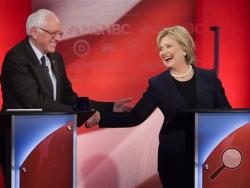DURHAM, N.H. (AP) — Fireworks flying in their first one-on-one debate, Hillary Clinton accused Bernie Sanders Thursday night of subjecting her to an "artful smear" while Sanders suggested the former secretary of state was a captive of America's political establishment.
The two Democrats embraced a markedly more contentious tone than when they last debated before the year's presidential voting began in Iowa, and it signaled how the race for the nomination has tightened five days ahead of the first-in-the-nation primary in New Hampshire next Tuesday.
The two argued over ideas, over tactics and over who has the liberal credentials to deliver on an agenda of better access to health care, more affordable college, fighting income inequality and more.
It was Clinton who was the main aggressor, saying Sanders could never achieve his ambitious and costly proposals. Then she took after the Vermont senator for his efforts to cast her as beholden to Wall Street interests because of the campaign donations and speaking fees she's accepted from the financial sector.
"It's time to end the very artful smear that you and your campaign have been carrying out," she said.
Sanders, for his part, suggested Clinton's loyalties were colored by a reliance on big corporate donors.
"Secretary Clinton does represent the establishment," he said. "I represent — I hope — ordinary Americans."
Clinton may say the right things, he suggested, but "one of the things we should do is not only talk the talk but walk the walk."
"I am very proud to be the only candidate up here who does not have super PAC, who's not raising huge sums from Wall Street and special interests," he said.
Where Clinton aimed considerable criticism at Sanders, the Vermont senator focused much of his fire on what he says is a political system rigged against ordinary Americans.
He said that when a "kid gets caught with marijuana, that kid has a police record." But when "a Wall Street executive destroys the economy" and pays a $5 billion settlement, he has no criminal record.
"That is what power is about, that is what corruption is about," he said.
Clinton, unwilling to cede the issue to Sanders, insisted her regulatory policies would be tougher on Wall Street than his.
"I've got their number," she said, "the Wall Street guys."
Asked if she would release transcripts of her paid speeches to Wall Street interests and others, Clinton was noncommittal, saying "I'll look into it." She had struggled a day earlier to explain why she accepted $675,000 for three speeches from Goldman Sachs.
Clinton called Sanders' sweeping proposals on health care and education "just not achievable," while Sanders countered that Clinton was willing to settle for less than Americans deserve.
The race for the Democratic nomination, once seen as a sure thing for Clinton, intensified this week after Sanders held the former secretary of state to a whisper-thin margin of victory in Iowa's leadoff caucuses. The tone of their back-and-forth has become increasingly sharp, and the candidates agreed to add four more debates to the primary season schedule, including Thursday's faceoff in Durham.
In fresh evidence of the tightening race, Clinton reported that her campaign had raised $15 million in January — $5 million less than Sanders and the first time she's been outraised by her opponent. Her finance director called the numbers "a very loud wake-up call."
Sanders has a big lead in New Hampshire polls, but he was eager to lower expectations for his finish there, casting himself as an underdog.
Clinton, for her part, signaled her determination to at least narrow the gap before Tuesday's vote. Her prospects are much stronger in primaries and caucuses after New Hampshire, as the race moves on to states with more diverse electorates that are to her advantage.
The two renewed their running debate over who is the real progressive, with Clinton accusing Sanders of quoting her selectively to diminish her credentials.
On foreign policy, Sanders renewed his criticism of Clinton for her vote as a senator to authorize the war in Iraq, a vote she later said was a mistake.
Clinton retorted: "A vote in 2002 is not a plan to defeat ISIS. We have to look at the threats that we face right now."
Sanders allowed that while Clinton had been secretary of state, "experience is not the only point. Judgment is."
On a nagging issue, Clinton was asked if she was sure nothing problematic would come of the ongoing investigation into her use of a private email account and server to handle official messages when she was secretary of state, some of them later classified as top secret.
"I am 100 percent confident," she said.
When the fireworks had died out at the end of two hours, the two candidates had some conciliatory words for one another, with Sanders declaring, "on our worst days, I think it is fair to say, we are 100 percent better than any Republican candidate"
The Durham debate was the first faceoff for Clinton and Sanders since former Maryland Gov. Martin O'Malley dropped out of the race after a poor showing in Iowa.
The close result in Iowa was the latest twist in an election campaign that, until recently, had been dominated by the crowded and cacophonous field of Republicans, who spread out across New Hampshire this week.
Donald Trump, who finished second in Iowa, stepped up the pace of his campaign and acknowledged he should have had a stronger ground operation in Iowa. Jeb Bush, his campaign lagging, brought in his mom, former first lady Barbara Bush, who praised him as "decent and honest and everything we need in a president."
___
Benac reported from Washington. Associated Press writers Laurie Kellman in Washington and Scott Bauer contributed from Madison, Wisconsin.
___
Follow Nancy Benac on Twitter at http://twitter.com/nbenac and Lisa Lerer at: http://twitter.com/llerer

